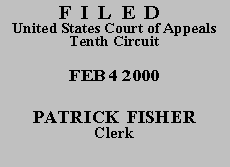

| DALENE F. CHARLES,
Plaintiff-Appellant, v. WICHITA EAGLE AND BEACON PUBLISHING COMPANY, Defendant-Appellee. |
|
Plaintiff Dalene F. Charles appeals from an order of the district court that granted summary judgment to defendant Wichita Eagle and Beacon Publishing Company on her claims that her termination from employment violated the Age Discrimination in Employment Act, 29 U.S.C. §§ 621-34, and breached an implied-in-fact employment contract. We have jurisdiction under 28 U.S.C. § 1291, and affirm.
Plaintiff worked in defendant's Classified Advertising Department for about twenty-six years. She was discharged after being held responsible for certain mistakes, the last one being the omission of approximately 165 garage sale ads from the May 2, 1997 edition of the newspaper. Defendant asserted that plaintiff's mistakes, especially the last one, were expensive and embarrassing for the company. Plaintiff was fifty-eight years old when she was fired. She contended that other employees shared responsibility for the referenced mistakes, that nobody else was fired on account of them, that she did not receive the progressive discipline the company had promised her, and that defendant's true motivation for her discharge was illegal age discrimination. The district court reviewed the evidence in detail, and concluded that "the uncontroverted facts show the primary responsibility [for the mistakes] was [plaintiff's], and [her] termination was not a pretext for unlawful discrimination." Appellant's App., Vol. IV at 942 (district court's Memorandum Order at 1).
We review the grant of summary judgment de novo, applying the same standard under Fed. R. Civ. P. 56 that the district court used. See Adler v. Wal-Mart Stores, Inc., 144 F.3d 664, 670 (10th Cir. 1998). Summary judgment is appropriate "if the pleadings, depositions, answers to interrogatories, and admissions on file, together with the affidavits, if any, show that there is no genuine issue as to any material fact and that the moving party is entitled to a judgment as a matter of law." Rule 56(c). "Supporting and opposing affidavits shall be made on personal knowledge, shall set forth such facts as would be admissible in evidence, and shall show affirmatively that the affiant is competent to testify to the matters stated therein." Rule 56(e).
Plaintiff argues on appeal that the district court: (1) improperly found that there were no genuine issues of material fact to be tried; (2) failed to construe all inferences from the evidence in her favor as the nonmoving party; and (3) failed to apply this court's standards concerning the establishment of the prima facie case and burden of proof in an age discrimination case.
We find plaintiff's arguments to be misplaced. The district court struck twelve of the affidavits plaintiff presented in opposition to defendant's motion for summary judgment on the basis that they were not admissible under Rule 56(e). Yet, most of the evidentiary cites in her brief on appeal are to these excluded affidavits. She does not challenge on appeal, except in the most conclusory fashion, the district court's exclusion of her evidence.
In response to defendant's summary judgment motion, it was plaintiff's burden to "go beyond the pleadings and 'set forth specific facts' that would be admissible in evidence in the event of trial from which a rational trier of fact could find for" her. Adler, 144 F.3d at 671 (quoting Rule 56(e)). It was plaintiff's burden to demonstrate that her evidence was admissible under Rule 56(e). See id. at 671, 672. In the face of the district court's determination that plaintiff's affidavits were not admissible under Rule 56(e), it became incumbent upon plaintiff to point out to this court why her evidence was improperly excluded before she relied on it. Because she makes no reasoned argument to this effect in her brief on appeal, we deem the issue waived. See, e.g., id. at 679; Gross v. Burggraf Constr. Co., 53 F.3d 1531, 1547 (10th Cir. 1995).
The result is that plaintiff's appeal is left essentially unsupported by citation to admissible evidence. However, "bald assertions in briefs that there are genuine issues of material fact are insufficient to merit reversal of summary judgment." Adler, 144 F.3d at 679. The few remaining assertions of fact that appear to be validly supported are insufficient to overcome the grant of summary judgment to defendant. Thus, plaintiff's appeal fails.
The judgment of the United States District Court for the District of Kansas is AFFIRMED.
Entered for the Court
Circuit Judge
*. This order and judgment is not binding precedent, except under the doctrines of law of the case, res judicata, and collateral estoppel. The court generally disfavors the citation of orders and judgments; nevertheless, an order and judgment may be cited under the terms and conditions of 10th Cir. R. 36.3.